Rooted in the experiences of Black people in this country who actively resist de-humanization, #BlackLivesMatter: A Guide to the Movement was conceived as a call to action.
I first met Opal Tometi half an hour before an appearance at a university in Pennsylvania in the fall of 2015. She explained to me that #BlackLivesMatter was created in 2012, after Trayvon Martin’s “murderer,” George Zimmerman, was acquitted for his crime, and the dead 17-year old Trayvon was posthumously placed on trial for his own murder.
But Blacks weren’t the only ones affected by the verdict. Surveys by respected companies indicated that white America also took heed.
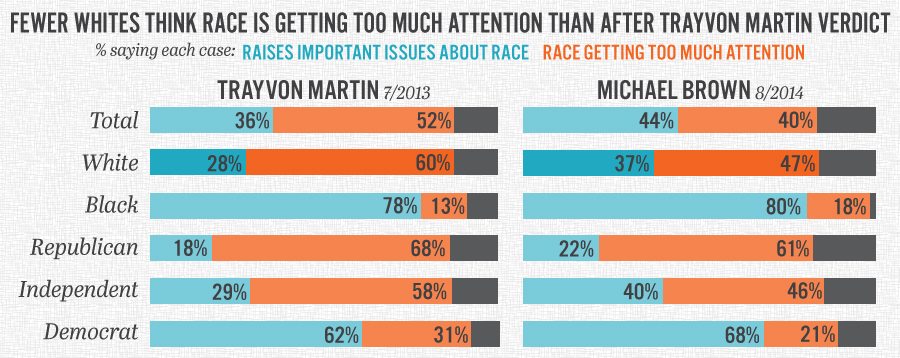
Tometi said that when the verdict was announced a cold chill ran through her body. And at that moment, she and her good friends started tweeting, which was the beginning of the #BlackLivesMatter movement.
In response to the death of Martin and the acquittal of his killer, activists Cullors, Garza, and Tometi rallied together on Twitter to create visibility with a unified phrase: Black Lives Matter. As more black Americans —like Tamir Rice, Michael Brown, Eric Garner and Freddie Gray—were killed by police, the phrase gained prominence and resonance—both on Twitter, and in the protests that would follow, nationwide.
Rooted in the experiences of Black people in this country who actively resist de-humanization, #BlackLivesMatter was conceived as a call to action and a response to what Tometi, Garza and Cullors called “the virulent anti-Black racism that permeates our society.” Black Lives Matter they claim, is a unique contribution that goes beyond extrajudicial killings of Black people by police and vigilantes.
#BlackLivesMatter went viral, thanks to social media, coinciding with the movement that was growing in St. Louis, MO, after 18-year old Mike Brown was killed by Ferguson Police Officer Darren Wilson. The street demonstrations covered extensively by the 24 hour news channels introduced an even wider audience to the BLM movement.
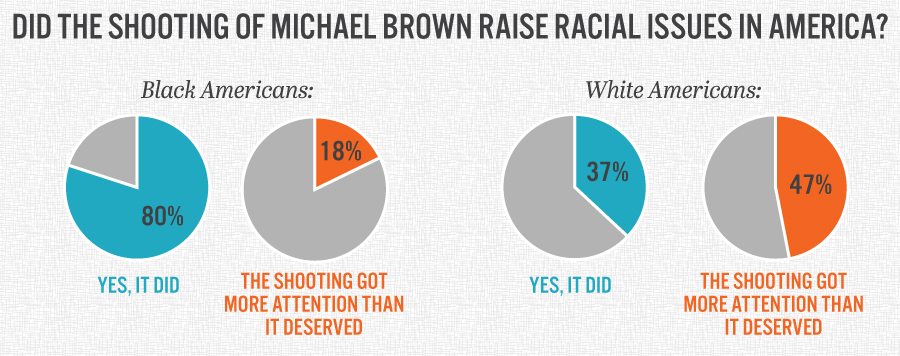
Garza, Cullors and Tometi subsequently hosted national conference calls focused on issues of critical importance to Black people. The BLM movement connected people across the country working to end the various forms of injustice impacting African American people. They created space for the celebration and humanization of Black lives.
The movement has gained potency for a number of reasons, not the least of which was this: Brown’s death at the hands of a white police officer in Ferguson, Missouri, reopened the subject of black Americans’ relationship with the police, and more generally the differences in the way blacks and whites look at the criminal justice and civil rights situations in the U.S.
Combined 2011-2014 data measuring Americans’ confidence in the police shows that 59% of whites have a great deal or quite a lot of confidence in the police, compared with 37% of blacks.
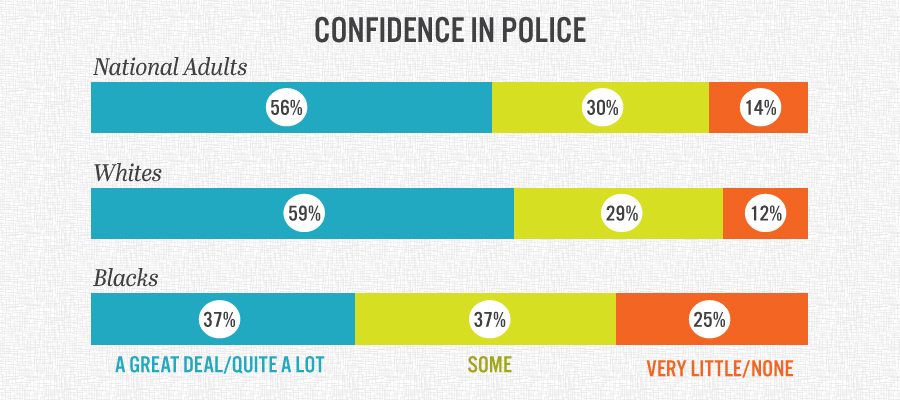
Blacks in the U.S. have a significantly lower level of confidence in the police as an institution than do whites.
Police are one the three highest-rated institutions out of 17 tested in terms of whites’ confidence, behind only the military and small business. Among blacks, confidence in police drop to seventh on the list, behind not only the military and small business, but also the presidency, the church or organized religion, the medical system, and television news. This racial gap in confidence in the police has been evident in the data throughout the past decade and a half that Gallup has been measuring these trends on an annual basis.
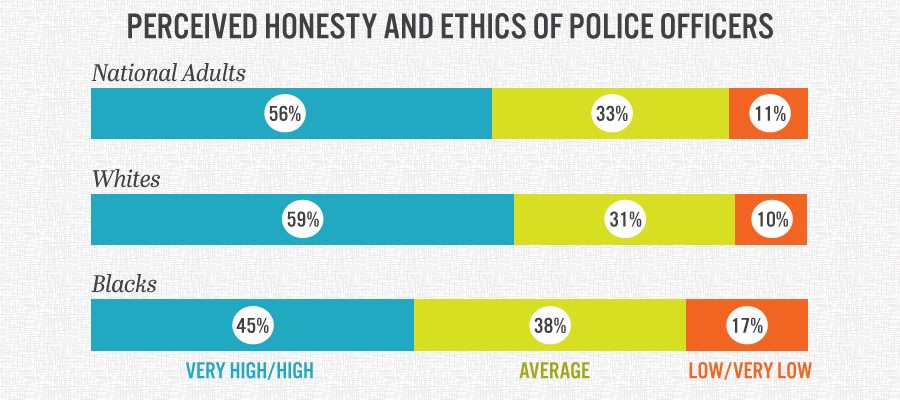
Gallup asked Americans to rate the honesty and ethics of various professions – and the results showed a marked black-white divide in views of police officers, although the gap is not as large as the overall confidence gap in police as an institution reviewed above. In Gallup data from 2010-2013, 59% of whites say the honesty and ethics of police officers is very high or high, compared with 45% of blacks.
African Americans are much more likely than whites to say that new civil rights laws are needed to reduce discrimination against blacks. In Gallup’s Minority Rights poll in 2013, 53% of blacks said such new laws are necessary, compared with 17% of whites.
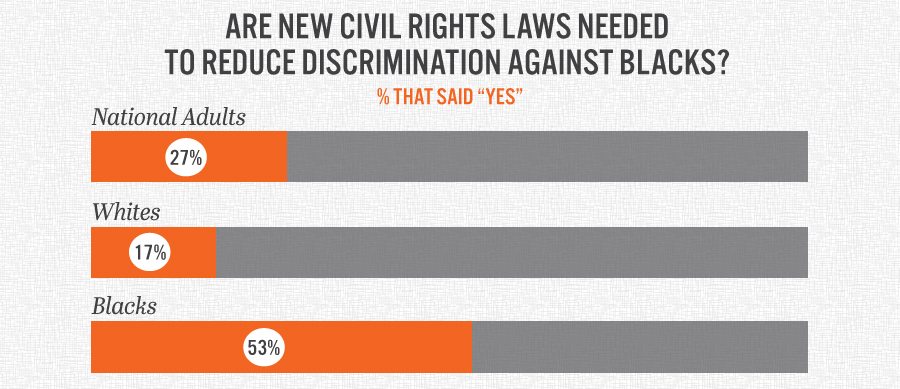
Gallup poll taken: 6/13-7/4, 2013
#BlackLivesMatter has brought into the light what many in African American communities already knew: that young black men were 21 times as likely as their white peers to be killed by police. And the proof was drawn from reports filed for the years 2010 to 2012, the three most recent years for which FBI numbers are available.
The African American boys who have been killed by police are disturbingly young. Overall, there were 41 teens 14 years or younger reported killed by police from 1980 to 2012: 27 of them were black, 8 were white; 4 were Hispanic and 1 was Asian.
That’s not to say officers weren’t killing white people. Indeed, 44 percent of all those killed by police across the same 33 years were white.
Who is killing all those black men and kids? Mostly white officers. But in hundreds of instances, black officers, too. Black officers account for a little more than 10 percent of all fatal police shootings. Of those they kill, though, 78 percent were black.
There were 151 instances in which police noted that teens they had shot dead had been fleeing or resisting arrest at the time of the encounter. 67 percent of those killed in such circumstances were black. That disparity was even starker in the last couple of years: of the 15 teens shot fleeing arrest from 2010 to 2012, 14 were black.
And then there was the shooting of Laquan McDonald by a Chicago policeman, adding more fuel to the growing fire of mistrust. The officer was charged with murder. When this video was released #BlackLivesMatter protests broke out in Chicago and around the nation.
Do police always list the circumstances of the killings? No. Actually, there were many deadly shooting where the circumstances were listed as “undetermined.” 77 percent of those killed in such instances were black.
Certainly, there were instances where police truly feared for their lives. The vast majority of cops are good cops.
Meanwhile, as the movement grows in strength, even in light of the Chicago shooting, there is some indication that it still doesn’t matter much to many Americans. The #BlackLivesMatter movement is currently pushing an agenda to address police misconduct, overzealous policing and racial bias in the criminal justice system.
But according to a poll by a New York Daily News/Rasmussen Reports telephone survey, by a 2-to-1 margin, likely voters said they do not think the Black Lives Matter movement supports reforms to ensure all Americans are treated fairly under the law.
We’ll leave it to you to decide how relevant the Black Lives Matter movement is to your life. Wherever you stand, some of the issues it has brought to light are worthy of discussion and analysis because everyone deserves equal justice under the law.
Sources:
Rasmussen Reports
http://libguides.wellesley.edu/blacklivesmatter/statistics
http://www.gallup.com/poll/175088/gallup-review-black-white-attitudes-toward-police.aspx
http://www.bjs.gov/index.cfm?ty=tp&tid=7 [Bureau of justice statistics]
Related Rankings:
Top 25 Best Value Online Paralegal Certificates
Top 25 Most Affordable Online Paralegal Associate’s Degree Programs
Top Online Bachelor’s in Paralegal Degree Programs